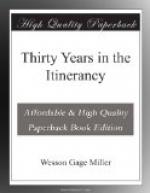Conference of 1805.—The War Closed.—Lay Delegation the Next Question. Rev. George Chester.—Rev. Romulus O. Kellogg.—Missionary to China.—Rev. L.N. Wheeler.—Appointed to Fond du Lac District.—Marriage of our Eldest Daughter.—Removal to Fond du Lac.—Rev. T.O. Hollister.—State of the District.—Rev. J.T. Woodhead.—Waupun.—Rev. D.W. Couch.—Lamartine.—Rev. I.S. Eldridge.—Horicon.—Rev. Walter McFarlane.
The Conference of 1865 was held Oct. 4th in Summerfield Church, Milwaukee, Bishop Baker presiding, and assisted by Bishop Ames. Rev. Samuel Fallows was elected Secretary, and Revs. Wm. P. Stowe, E.D. Farnham and R.W. Bosworth Assistants.
The relentless war that had raged for four years had now closed. The clouds had lifted from the fields of conflict, and the Conference was now able to take note of the past and anticipate the future of the country. The report adopted at this session, presented by the Committee on the state of the country, was a masterly document. It recognized the fact that the Wisconsin Conference, since its organization, had exhibited a bold and manly opposition to American Slavery. That the recent rebellion, aiming its blows at the Government, bought by the blood of Revolutionary patriots, was the outgrowth of the institution of Slavery. And that the Conference, in common with the Laity, and loyal citizens of the North generally, had acquitted herself nobly, in standing by the Government in its hour of trial, and, having rendered this service as a Christian duty, she had nothing to take back. Looking out upon the future, she also anticipated the coming day when equal rights should be accorded to all, irrespective of color or nationality.
The question of Slavery and the frightful war it had entailed upon the country having passed away, the Conference now took up the subject of Lay Delegation. And since the subject is new to many, it may not be improper to devote to it a brief examination.
The question has been raised, “How came it to pass that in the organization of the Methodist Episcopal Church, the Laity were not associated with the Ministry in the Conferences?” The question is a legitimate one, and deserves a considerate answer.
It should be remembered that the establishment of the Church was rather a growth than an organization. This one fact accounts, doubtless, for the peculiar feature referred to. Had there existed at the outset a large body of Christians, including Ministers and Laymen, awaiting an organization, at the time Mr. Wesley began his labors, it is possible that he might have so combined them in appropriate relations as to secure a united responsibility. But such was not the state of the case. In the strict sense of the word, Mr. Wesley had no Church, and no people out of which to organize one. And it is possible that he began his labors without an expectation of organizing a Church. His great concern, overleaping every other consideration, was to save souls. In this work he was ready to call to his aid such instrumentalities as gave the best promise of the desired result. It was but natural that, whenever he met a congenial spirit, there should be an affiliation. In such case a unity of effort would necessarily follow.




